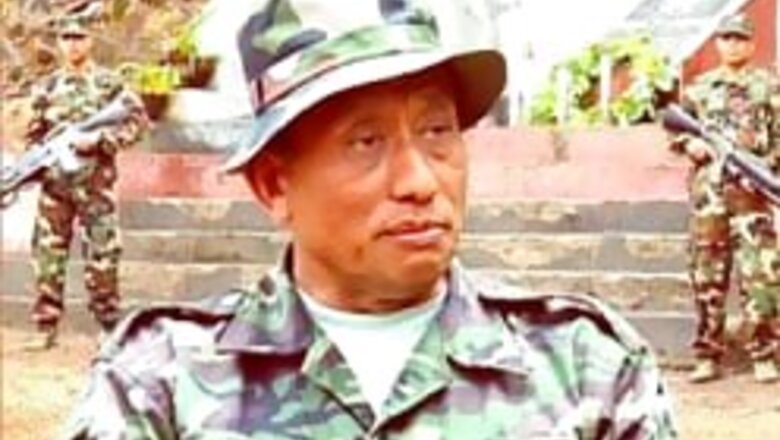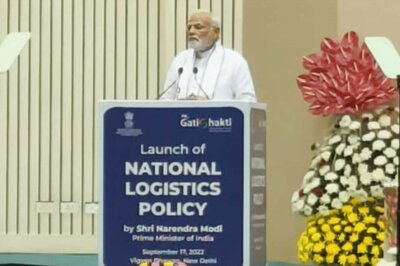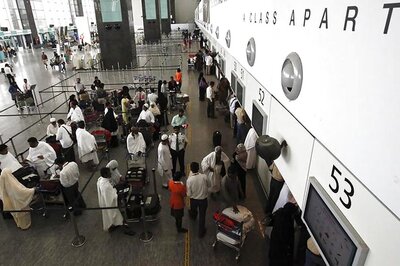
views
In an exclusive interview, United National Liberation Front (UNLF) Chief, Sanayaima reveals to V K Shashikumar, Special Investigations, CNN-IBN, his plans for a mass uprising in Manipur and claims that he is prepared for urban guerilla warfare.
V K Shashikumar: Why do you claim to have an advantage over the Indian Army deployed in Manipur?
Sanayaima: It’s a combination of factors. Terrain is one of them and the cause, which you fight for, is another very important factor. We have a cause to fight for and for us, it is a question of life and death. If we stop fighting, we don’t exist as a nation and as people. Another major factor is the support of the local people. We have the support of our own people and they are in an alien country. So, a combination of all these factors has made all the difference.
V K Shashikumar: Separatists in Jammu and Kashmir also dispute the Jammu and Kashmir merger agreement. You dispute the Manipur merger agreement. So on what grounds are you demanding secession?
Sanayaima: Jammu Kashmir and Manipur gained independence when the British left in 1947. Between 1947 and October, 1949, we were an independent country. And Kashmir was also somehow annexed and so was Manipur. The extracted under duress the signature of the King (Bodh Chandra Singh) on the so-called merger agreement in September 1949. In between 1947 and 1949, Manipur became a constitutionally democratic country. The king became the head of the state. In 1948, a general election was held under a democratic Constitution, an assembly was elected and a council of ministers was formed.
So at the time of annexation in 1949, democracy was already functioning in Manipur when democracy was yet to be established in India. So in a sense, the annexation of 1949 is suppression or murder of democracy in Manipur by the largest democracy in the world. India is supposed to be the largest democracy in the world and when their Constitution was about to be adopted, it annexed Manipur and abolished the democratic institutions of Manipur. That’s how it all began - the conflict – the genesis of the Manipur-India conflict.
PAGE_BREAK
V K Shashikumar: But your separatist movement is violent. Do you have links with organisations like the Liberation Tigers of Tamil Eelam (LTTE)?
Sanayaima: The difference is there was no Tamil Eelam. They want to create a new Eelam. And for us, we already were an independent country. We want to regain our sovereign independence. So this is a question of regaining our sovereign independence, not a question of demanding independence from India. We’re not demanding anything from India. We just want what ought to be ours and we’ll fight for that.
V K Shashikumar: It’s a hidden war that you’re fighting. It is not talked about in Delhi or in the media, what’s your view on that?
Sanayaima: I would say that the Indian media, particularly the mainstream media, seems to be not so much interested in what is in this part. That’s why there hasn’t been much coverage (of the movement) for the last many decades. That’s the indifference of the mainstream Indian media. Now we see something more -- a deliberate policy not to highlight the sufferings of the people, their struggle and their aspirations, and the Indian policy in this regard I think now is the obvious policy adopted by the mainstream media. I think this is part of the Indian policy.
V K Shashikumar: So what’s your political vision?
Sanayaima: We want to move forward along the historical development of the world. But our basic stance is to have our sovereign independence back. And the second one is taking this region as a whole. We take the so-called north-eastern region as a composite core, Manipur being a part of that core. We believe that all ethnic groups in this region should coexist together.
They should unite so that we can form some sort of a union of independent states or something like that. We believe in the basic unity of the region, which is more important than the apparent differences in language and social things. Despite all those differences, a basic unity remains the unity of inter-dependence. Manipur is a multi-ethnic country comprising more than 38 small ethnic groups. This is the basis of our political vision.
We believe all ethnic groups can coexist respecting one another’s distinct identity. However, the majority community should not try to dominate the minority communities. This is the basis of our political outlook. And we believe that there should be autonomy at all levels. Even if a small community of 200 people can have autonomy if they so desire.
PAGE_BREAK
V K Shashikumar: You seem to be very confident about ethnic affiliation. But recent history suggests that there’s a deep ethnic divide between various ethnicities and there’s a clash between ethnicity on one hand and identity on the other. How do you expect to bridge that divide?
Sanayaima: We take it to be a necessary step of historical development. We’re passing through that critical stage and all ethnic communities are at an essential stage of historical development. Another stage will come after this and we believe that, despite one’s ethnicity, all of us will realise that greater unity will evolve in the process of this ethnic assertion.
As we have been saying several times, ethno-exclusive ideologies is a temporary phenomena and this region will develop as any other region from ethnic identity level to greater than identity and we’re moving towards that. Now what you see are ethnic conflicts. We should not rule out external factors and forces taking advantage of this ethnic group situation.
V K Shashikumar: But that might continue.
Sanayaima: India is very much trying to keep us divided on ethnic lines pitching one ethnic group against another. The same old divide-and-rule policy. The colonial game is still going on. Despite all those external factors, we believe that all the ethnic communities in Manipur and of course in the region will come to unite. That is the historical process. That will happen, but of course it will take time.
V K Shashikumar: Do you envisage a situation to come where Nagas would have bridged the differences with Kukis. The Kukis would have learnt to coexist?
Sanayaima: I’m saying that something is moving. We are moving towards that direction and we believe that the major communities should realise the importance of getting united. Major communities should make more sacrifice to bring about unity so that at certain points of historical developments, the minority communities won’t be alienated. They should be brought back again. They should realise the necessity of co-existence and co-development. If we don’t realise this, then we will we sink together. No one will survive.
PAGE_BREAK
V K Shashikumar: What about United Liberation Front of Assam (ULFA)?
Sanayaima: That is there. Despite that, if ULFA wants to survive, it should realise that just peace talks will not bring peace. Peace talks will not bring any of our objectives nearer to us. That should be substantial. I don’t believe ULFA will go to peace talks without any concrete assurance of the substance of the talk, which is the core issue. ULFA’s core issue is the restoration of Assam’s sovereignty. So far, the Governmant of India (GOI) has not responded to that.
V K Shashikumar: And the National Socialist Council of Nagaland (NSCN)-IM?
Sanayaima: Well, obviously the talks have gone on for too long to make any headway. It’s not moving toward any solution. I think it’s time that it realised the Indian policy and the so-called peace talks. Peace is very temporary.
V K Shashikumar: Do you think the hidden wars in India’s Northeast is a failure of its democracy and failure to satisfy regional political aspirations?
Sanayaima: Yes. That aspiration was always there, because in the elected Assembly of Manipur in 1948, the ruling alliance was Praja Santi Sabha. They were not in favour of Manipur’s merger with India. The GOI knew this and in the instrument of accession. it is on record. The instrument of accession retained the power of the king to reject any future Constitution of India.
Given these two factors, the ruling party was not in favour of merger with India. The king was also in favour of retaining a distinct identity of Manipur. But having retained the sovereign power under the instrument of accession, the GOI had still annexed Manipur in 1949 because on January 26, 1950, the (Indian) Constitution would become effective. Manipur had to be annexed before that.
You may remember that Manipur didn’t send any representative to the Indian Constituent Assembly. We are not a signatory to the Indian Constitution. So we had to be annexed according to India’s viewpoint. So till then, we had regarded a so-called merger agreement to be not a valid document legally, which was extracted under duress, keeping the king under house arrest for three days and forcing him to sign the merger pact. The elected assembly did not ratify the so-called merger agreement. It was simply dissolved.
PAGE_BREAK
V K Shashikumar: So even half-a-century later, let’s say, even if there was good governance and no corruption, things would have been the same. The aspiration would have taken the character of an armed struggle.
Sanayaima: Yes. It is not because of corruption and it is not because of unemployment or economic backwardness that we’re now engaged in an armed struggle. It is the legitimate national aspiration of our people that is driving us to fight against a big country like India, which has the third largest Army in the world.
V K Shashikumar: But aren’t you also a beneficiary of the system that you fight and are opposed to?
Sanayaima: Beneficiary in the sense that is due to us? Having ruled Manipur for the last 56 years, in one sense, it is a lost opportunity for us for development. Our people are entitled to the grants and the budgetary grants that the Indian Government gives to Manipur. It is not even a fraction of what our people are entitled to. The system has failed, so any amount of money being pumped into it will not deliver.
V K Shashikumar: We are told that a little component of that money also comes to you. Do you use that for development purposes?
Sanayaima: We very much use that. If you go to rural areas, you’ll find many projects being implemented by us – irrigation systems, water supply schemes and even roads in interior areas. We have implemented the money which otherwise would have gone to the pockets of those authorities.
V K Shashikumar: Why is it that you stand away from the political process?
Sanayaima: The present system is a failed system. So the system by itself will not work, so we use our own system. We ask MLAs, ministers, bureaucrats to do what is beneficial for the people.
PAGE_BREAK
V K Shashikumar: But they’re not doing that?
Sanayaima: Some of them have to do. They do that not within the system, but under our influence.
V K Shashikumar: Is there anyway, according to you, to reconcile demands for a Greater Nagaland and Kuki nationhood and your demand for an independent Manipur? Boundaries make or break lives here.
Sanayaima: We’re opposed to any sort of political demands like Greater Nagaland. We feel that this is something that has to be decided among ourselves and among all the communities and we believe that the only way for future is coexistence and co-development, whether you call it Nagaland, Kukiland or whatever it is. We, however, don’t believe getting or demanding land in the Indian system.
But as independent people, we should coexist and fight together for our independent existence. We will not adjust without fighting for that. We may adjust individually, but as people and as a distinct human group, we will not exist. Just see how much the demography has changed. There has been a complete change in the demographic structure of the region because of foreigners’ influx.
V K Shashikumar: Are you talking about influx from Bangladesh?
Sanayaima: Not only Bangladesh, but also from India. Out of 2.5 million populations, about 7-8 lakhs are outside population in Manipur. See how it has disturbed the original demography. This is more disturbing to us.
V K Shashikumar: Do you think, this will also be a cause for violence?
Sanayaima: In Manipur, you don’t see so much xenophobia as you might have seen elsewhere. Our people are more tolerant, but when it crosses a limit, we cannot say if it will turn into a violent reaction.
V K Shashikumar: Will democratisation of India’s federal structure satisfy the political aspirations you represent?
Sanayaima: Well, first of all our sovereign independence has to be recognised. It is not a question of giving up the armed struggle. In order to resolve the Manipur-India conflict -- which is not just the political conflict, it is now a politico-military conflict -- we have proposed holding of a plebiscite under the supervision of the United Nations.
We’ve made a four-point proposal. One, hold a plebiscite under UN; secondly UN peacekeeping forces be deployed in Manipur, third, the UNLF deposit all its arms to the UN authority on a date is fixed by the UN prior to the date of plebiscite. India should also reciprocate by withdrawing all its forces from Manipur, Lastly, the UN authority would hand over power according to the result of the plebiscite. That’s the four-point proposal we have made. This is the position we are taking right now.
PAGE_BREAK
V K Shashikumar: When the UN has rejected the question of a plebiscite in Jammu and Kashmir, saying that when elections are being held, the issue of plebiscite doesn’t exist any more and the conditions don’t exist. Why are you so confident that the UN will or the international community will accept your proposal?
Sanayaima: When our people stand up as one and fight for what is their due, I think the international community should stand up and see what’s happening there. They cannot just sit down tight when the people start fighting for their rights as a whole.
V K Shashikumar: It is true, but your war is confined to jungles. It doesn’t move beyond jungles. It’s really a war, which is hidden and nobody knows about it. How do you expect this war to get out of jungles and for the world community to accept that this is indeed a people’s war?
Sanayaima: You will see that in the coming years, a people’s movement for plebiscite. If you go down the valley, the movement is gaining momentum there and people in different places are holding meetings and discussions for plebiscite. That will take the character of a movement.
V K Shashikumar: So it’s not as if UNLF doesn’t have a strategy, it does have a strategy?
Sanayaima: Yes, we do have a strategy, both political and military. And our strategy is to get the entire people involved in the struggle.
V K Shashikumar: So are you also going to upscale your armed campaign?
Sanayaima: Yes, definitely. Having proposed a plebiscite as the solution to the Manipur-India conflict doesn’t mean we’ll leave our armed struggle. UNLF has not given up its position of regaining our sovereign independence. Until and unless we regain our sovereign independence, we will fight to the last and if India accepts a plebiscite in between, we’re in for that. We propose the plebiscite to let people decide. We will abide by the decision of the people in the plebiscite. But as of now, we will definitely fight.
PAGE_BREAK
V K Shashikumar: In terms of tactics, are you saying that the UNLF might make forays into urban guerrilla warfare.
Sanayaima: We would do anything that would take our struggle one more step forward.
V K Shashikumar: Are you holding back your cards?
Sanayaima: Yes, very much. We’ll always try to give a surprise to the Indian forces and they will always have that surprise from us. Even Pranab Mukherjee, the Indian Defence Minister, admitted in Parliament that it was not so easy to enter our areas last time. They thought that in a few days’ time, they would reach our headquarters.
V K Shashikumar: The NSCN-IM has said that if the peace process doesn’t lead to any conclusive stage then we might be forced to take the war to the cities because that’s where you hurt political interests. People sit up and realise that. Have you also come to that phase?
Sanayaima: For us, it’s a strategy that we have adopted right from the very beginning. How we fight against India is both a political and military strategy and how we mobilise our people for the struggle is a sort of a comprehensive strategy on the basis of which we’ve been trying to build our struggle. It is comprehensive strategy and not influenced just any factors like peace process.
V K Shashikumar: I seem to be getting the feeling that you’re trying to evade a question that I have been trying to ask you for a long time. Will you take this armed campaign to the cities?
Sanayaima: Yes, certainly when the time comes.
V K Shashikumar: So, you would be doing that?
Sanayaima: When the time comes, we certainly will, because our objective is to drive away the Indian occupational forces. That time will come when the situation permits us.
V K Shashikumar: The Indian Army is engaged in flushing out operations. How will you avoid this pincer-like grip coming from all sides?
Sanayaima: They have moved in about three brigades there and we have avoided that. We have always avoided direct confrontation and that is part of our strategy. We fight when we want to and we fight when we can, that’s the strategy we adopt.
One of the biggest factors in our strategy is that we are fighting with the people, not just the armed cadres. We’re fighting along with our people. If you take our population into consideration and take India’s deployment – about 50-55,000. That is, you know if pitted against about two million people, 55,000 is nothing. If people rise up in arms, whatever they have is at stake, so 55,000 is not a big force.
PAGE_BREAK
V K Shashikumar: So what will we see in the days to come?
Sanayaima: You will come to see some sort of intefada.
V K Shashikumar: We’ll see an intefada, like in Palestine? What is the plan?
Sanayaima: Well, that is part of the strategy and a part of the strategy is to tell the world that something is happening here and you are morally obliged to come to our help. India should not be allowed to simply massacre our people.
V K Shashikumar: How soon do you think all this will happen?
Sanayaima: Sooner than five years maybe.
V K Shashikumar: Any other mass movements in the world apart from intefada from where perhaps you have drawn lessons to fine-tune your strategy? Have you been watching the Nepal experience?
Sanayaima: Yes, definitely. The Nepal experience is very inspiring. But in our case, it has built up spontaneously. You have seen the June 18 uprising in 2001 and also the July movement of 2004. That reflects the feelings and sentiments of our people developing spontaneously.
V K Shashikumar: Was the Manorama incident a kind of a landmark in the timeline of the Manipur movement?
Sanayaima: Manorama happens to be the immediate cause actually. But it was bound to happen. It may be Manorama or may not be Manorama, it doesn’t make much difference. Because of an Indian colonial repression and because of the resistance against the repression, it was bound to happen.
It is essentially because of the armed struggle, the conflict I mean. It is a product of the conflict and not an accident. Manorama is not an accident. It is a product of the conflict. It was bound to happen and it is this conflicting situation that will push the people forward to rise up against the system that represses them. And ultimately they will rise up.
PAGE_BREAK
V K Shashikumar: So how do you assess UNLF’s agenda as it stands today?
Sanayaima: In terms of military strength and capabilities, we are now controlling many parts of our state. At the military level, as I’ve already briefed you, in a present military situation, we’re now operating in a very wide area along this Chandal district, Ukhrul district into Asanpur district and in other parts of Manipur. In fact, we consider the whole of Manipur as a battle zone now.
We will fight the Indian forces anywhere and everywhere in Manipur according to how we choose and through our own capability. So far that goes with the military situation. And politically, in order to resolve the Manipur-India conflict, last January we proposed holding of a plebiscite under supervision of the United Nations. That proposal of plebiscite is basically to empower our people to assert their democratic right to take part in resolving the conflict, which affects their future directly. We believe in democracy and democratic values.
We have asked our people to assert their democratic right through the slogan of plebiscite and you may be aware that there are public meetings and discussions on plebiscite in many parts of Manipur. That campaign of plebiscite will be taken up in hill areas as well where our cadres are operating. In the political aspect as well, we believe that we have introduced a new political discourse about our struggle and that we believe is a progress in the struggle.
V K Shashikumar: But how will you withstand the capabilities of the Indian Army?
Sanayaima: In terms of the military scale and capabilities of our cadres, we are satisfied. It has improved a lot. I think in terms of tactical military training, our cadres are more efficient than the Indian jawans that we have tested it in the battlefield. However, we have other drawbacks like acquiring new technologies. Today is the day of technology-based warfare and India is using new technologies, even here also, using unmanned spy planes to do recee over these areas. We don’t have the technology to counter that Indian technology. Another area where we are not so much comparable to the Indian forces is that we don’t have that much of heavy weapons.
PAGE_BREAK
V K Shashikumar: But you may not find many takers for your plans for a mass uprising.
Sanayaima: You are right in saying that the struggle is passing through a phenomenon of alienation from the masses because of not-so-much works done by the revolutionary organizations, but by the armed groups. There are so many armed groups in Manipur, because arms are easily available. If you have two pistols, you can form a group and start collecting money from the people and from the state government departments.
It is those activities that have tarnished the image of the struggle and the contract works. This is one thing which has eroded the very soul of the organisation’s struggle, so we take it very seriously. That’s why the UNLF has decided that contract supply works should not be done by any revolutionary organisations. I cannot say that for other organizations, because they may have their own limitations or justifications in engaging in contract supply works. But UNLF has stopped doing any contract or supply works long time back.
V K Shashikumar: You must have been around 10 years old at the time of India’s Independence. What was your conception of the idea of India at that point of time?
Sanayaima: That is a very interesting question. I grew up and I thought that I am an Indian when I was in school and I thought of myself in that environment. But when I began to grow and when I was in college, I gradually realised that India is something different from what we are. Does that answer your question?
V K Shashikumar: Could you tell us about your influences in life?
Sanayaima: Yes. Vietnam’s Ho Chi Minh, a simple old man, how he worked for his people in a very simple way inspired me very much. I admire him as a leader of his people and for his individual courage and sacrifice. I admire him for his different characters but as a man, I admire Ho Chi Minh and Subhash Chandra Bose, he stood up against the British and took up arms. I admire that spirit.
V K Shashikumar: You’re accused of indiscriminately using mines and improvised explosive devices (IED) that have killed civilians.
Sanayaima: Our report says only six civilians have been injured and it was because they didn’t listen to their village authorities. They had been warned not to go there but they didn’t listen. They became victims of those IEDs. We never use anti-personal mines.



















Comments
0 comment